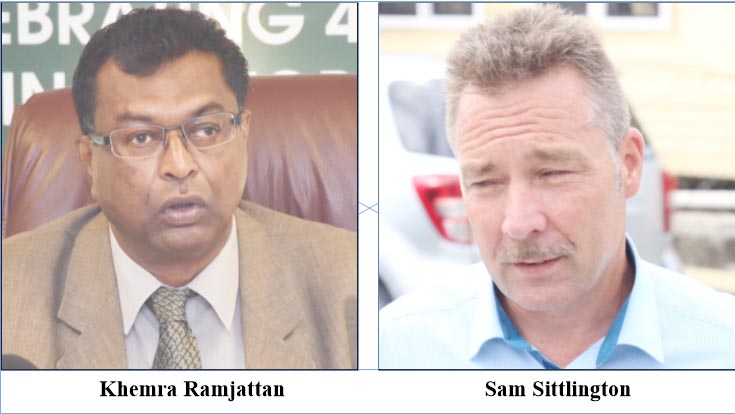Cash-sniffing dogs are to be sourced from the United States as part of the campaign against money-laundering, according to Minister of Public Security Khemraj Ramjattan.
He was speaking to the Sunday Stabroek about recommendations that had been made by Irish crime expert Dr Sam Sittlington but which had not yet been implemented.
The Ministry of Public Security took heed of the recommendations made by Sittlington and has been working to have them implemented but the process takes time and money, said Ramjattan.
“Things here don’t happen as fast as in Ireland or England where Mr. Sittlington is from. You must appreciate that from the time we had gotten those recommendations, we began working on it but it takes time,” Ramjattan told the Sunday Stabroek.
Sittlington, who undertook two stints here in 2016 and 2017 as a consultant for the Special Organised Crime Unit (SOCU), has returned, through assistance from the Government of the United Kingdom, to continue a project aimed at strengthening the operational and investigative ability of SOCU, with a view to tackling money laundering, terrorist financing and other serious crimes.
Last week, he said that he was concerned that since leaving the country last year, many of the cases initiated by him and the SOCU team were still with either the Director of Public Prosecutions (DPP) or the Police Legal Advisor (PLA).
He made reference to recommendations he had made last year to ease the burden of law enforcement authorities but which seemed to have fallen on deaf ears.
One such recommendation, which would not have cost much financially, was to have sniffer dogs at the airport to identify persons with large amounts of cash and to have a dedicated attorney at SOCU.
“One of my recommendations two years ago at the airport was to get cash dogs and at the borders so that they can sniff out cash. It is very successful in the UK and other European countries; it hasn’t been implemented yet,” Sittlington said.
“There are a number of other recommendations that I made last year, which, although approved, have not yet been implemented. One of them is to get an in-house lawyer in SOCU because the five special prosecutors that we have also have private practices and so they are conflicted between two different areas. So, ideally, we want one good lawyer in SOCU who can work with the cases from a cradle to crib process. They can finalise the case before it goes to the PLA or the DPP and try to quicken that actual process of getting a case to court,” he added.
‘Not easy’
Ramjattan told this newspaper that while it may appear that Sittlington’s recommendations were shelved, it is the opposite as his ministry has been looking to have almost all the recommendations implemented.
“Look, with the sniffer dogs for cash, we are already moving to get the dogs from the USA. It is not ordinary dogs. We have spoken to a number of persons and that process has already started. Not because it is dogs, those things cost money because you have to get certain trained dogs from the USA, you also have to get the handlers to go to the US to be trained with the dogs and to see and those sorts of things,” he said.
Addressing the recommendation of having an in-house attorney for SOCU, Ramjjattan said that wages and salaries seemed to be the biggest obstacle in attracting someone suitably qualified for the post.
This is because the fees to have a capable attorney stationed at SOCU would see the salary range way above that which the Public Service Salary Rules caters for.
“When you have a Special Attorney, there you want someone aptly qualified. That person would not want to work for less than US$4000 -$5000 minimum per month and you would have people who will say it is too much for a public servant and all of that. Public Service Rules [are] set and we can’t go in breach of that. A major setback is the quality of the legal minds in the eminent law areas. There is a shortage there too,” he added.
Another recommendation made by Sittlington was that there be talks with the relevant persons in the judiciary to have a stenographer at the court so as to relieve the burden on judges of taking all the notes for themselves.
Sittlington had also asked for help for the police’s Legal Advisor, Claudette Singh, as he felt she was overburdened with work.
According to the advisor, there are a number of things which are out of the control of SOCU and the slothful court process using archaic means of filing and records was only one in a line of many.
He said, “The court process is abundantly slow and one of the reasons for that is when a magistrate is taking evidence on the case … she has to write her own notes …so they can only sustain that for short periods. So, therefore, a case that was running last year, is still running this year. In fact, I was in court yesterday where the magistrate is still taking notes. It is a cumbersome process and unfair to the subject of the case and the police who are trying to give evidence from memory of things that they did during the course of that investigation. In the UK, we use a stenographer to take notes which allows the magistrate the freedom to take reminder notes, which quickens the process. Also that they can stay with the case longer during the day and shorten the actual court time.”
Agreeing with the recommendations, Ramjattan said that he, too, and even before the recommendations, took note that the PLA had much to do.










